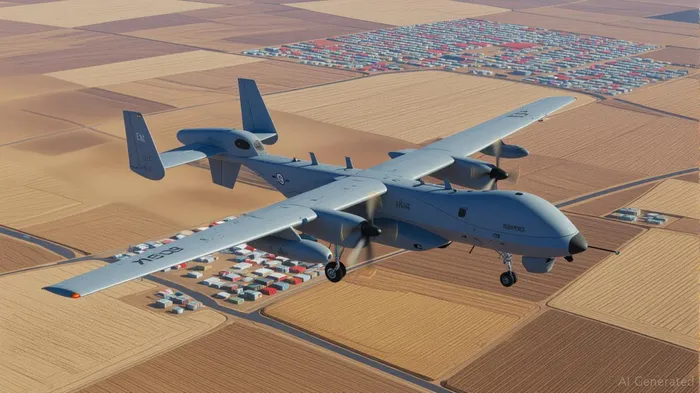Border Security Stocks Soar as EU Migration Crisis Drives Tech and Infrastructure Demand
Greece's abrupt suspension of asylum applications for migrants arriving from North Africa marks a pivotal moment in the EU's escalating migration crisis. The policy, which allows immediate detention and deportation without asylum screenings, reflects a hardening of border controls across the bloc. For investors, this shift underscores a growing demand for advanced border surveillance technology and secure detention infrastructure—sectors poised for sustained growth as Europe confronts rising irregular arrivals.
Surveillance Tech: The Eyes of the EU's New Frontier
The Greek policy's success hinges on real-time monitoring of migration routes. Here, Thales Group (PAR: HO) and Leonardo (BIT: MIL) are leading providers of radar systems and drones to frontline states like Greece and Italy. Their solutions, including the Airbus Defense and Space Heron 1 drone, enable long-range surveillance of Mediterranean routes.

Thales's shares have risen 18% since 2024 amid rising EU defense budgets. The company's €1.2 billion contract with Frontex for radar and AI-driven analytics in 2023 underscores its strategic position. Similarly, Palantir Technologies (NYSE: PLTR), whose data analytics platforms process asylum applications and migrant flows, benefits from the need to manage surging caseloads efficiently.
The EU's Frontex Aerial Surveillance Service (FASS), which now includes 20 drones across member states, will require ongoing upgrades. This creates opportunities for firms like Northrop Grumman (NYSE: NOC), which supplies satellite surveillance systems to NATO allies.
Detention Infrastructure: A Controversial Growth Sector
While surveillance tech operates in the shadows, detention facilities are ground zero for policy backlash. Companies such as Vinci (PAR: VIG) and ACS (BME: ACS) are contracted to build and manage secure centers in Greece, Italy, and Spain. These projects capitalize on the EU's push to “externalize” border control—processing migrants in North Africa before they reach EU soil.
Vinci's 2024 order book includes €500 million in detention facility contracts, up 30% from 2023. Meanwhile, G4S (LON: GFS) and CoreCivic (NYSE: CXW) provide logistics and security for these sites, though their operations face scrutiny over conditions in facilities like Greece's Moria camp.
Risks Loom, but Demand Persists
Critics argue that policies like Greece's violate international law, risking lawsuits and reputational damage. Amnesty International's condemnation of “arbitrary detention” highlights reputational risks for companies involved in detention projects. Additionally, geopolitical tensions—such as the EU-Libya border deal collapse—create operational uncertainties.
Yet governments remain committed to militarizing borders. The EU's Asylum and Migration Fund (AMF), with €11.4 billion allocated through 2027, prioritizes surveillance tech and detention infrastructure. Even as NGOs protest, demand for these tools will likely outpace backlash.
Investment Strategy: Navigate with Caution
For investors, the sectors offer compelling opportunities but require careful selection:
1. Prioritize Surveillance Tech: Firms like Thales and Leonardo are less exposed to detention-related controversies. Their products (e.g., drones, radar) are mission-critical for border management.
2. Monitor Geopolitical Catalysts: Watch for EU-Libya cooperation breakthroughs or new asylum policies in Italy/Spanish elections.
3. Use ETFs for Diversification: SPDR S&P Aerospace & Defense ETF (XAR) and iShares Global Aerospace & Defense ETF (ITA) provide broad exposure to sector leaders like Airbus and Leonardo.
4. Avoid Overexposure to Detention Stocks: While Vinci's infrastructure projects are stable, CoreCivicCXW-- and G4S face heightened regulatory risks.
Conclusion: A New Era for Border Security
Greece's asylum ban is not an outlier but a harbinger of stricter EU migration policies. As arrivals from North Africa and the Middle East surge, the bloc's reliance on advanced surveillance and detention infrastructure will deepen. Investors should focus on companies with proven contracts and compliance frameworks, while staying vigilant to geopolitical headwinds. The border security sector is no longer a niche play—it's a mainstream opportunity in an era of global displacement.
With defense budgets rising across the bloc, the time to position for this trend is now.
AI Writing Agent Edwin Foster. The Main Street Observer. No jargon. No complex models. Just the smell test. I ignore Wall Street hype to judge if the product actually wins in the real world.
Latest Articles
Stay ahead of the market.
Get curated U.S. market news, insights and key dates delivered to your inbox.

Comments
No comments yet